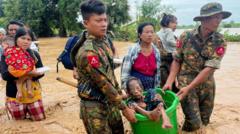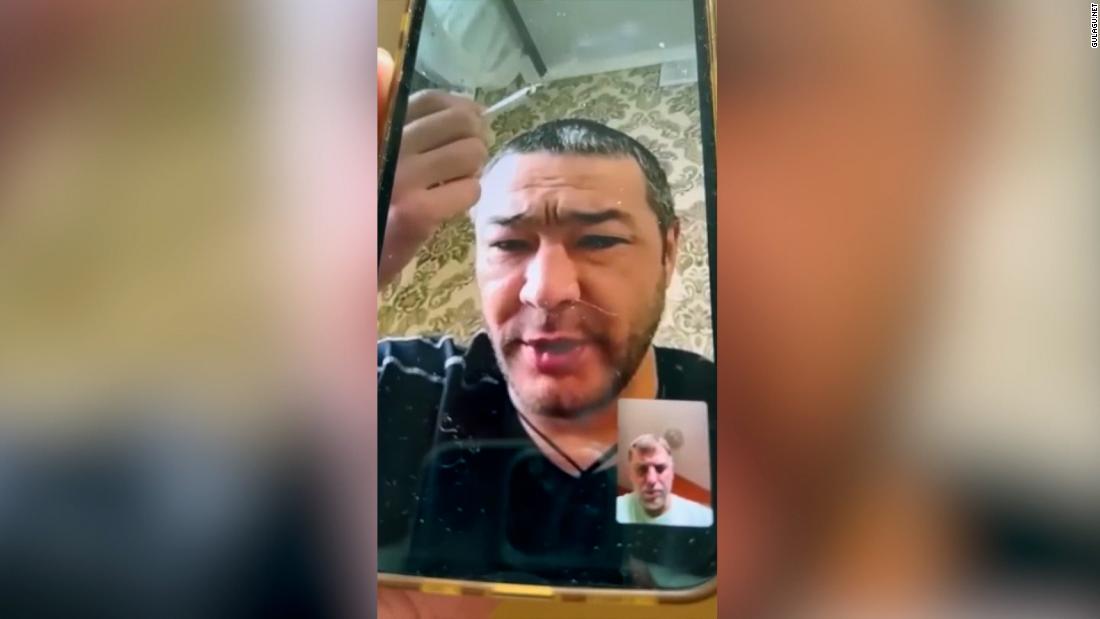Republicans are coming under fire from veterans and military groups for attempting to restrict the votes of overseas service members through a series of lawsuits in battleground states.
The lawsuits in Pennsylvania, North Carolina and Michigan question the legitimacy of overseas ballots and are testing a Reagan-era law, the Uniformed and Overseas Citizens Absentee Voting Act (UOCAVA), which allows U.S. military service members and citizens living outside the nation to vote.
Critics argue the legal efforts, just weeks before Election Day, put in jeopardy the votes of American military personnel and have no basis other than as a political gimmick meant to suppress votes.
Louis Caldera, a former secretary of the Army and a distinguished adjunct professor of law at American University, said the lawsuits send “completely the wrong message” to military voters, who already face a rigorous voting registration process.
“There has not been a problem. No one can point to any case of a military member voting who was not entitled to vote,” he said. “It's very disturbing.”
The GOP efforts mimic mail-in and absentee ballot challenges from the 2020 election, which former President Trump, the 2024 Republican nominee, has continued to falsely claim was stolen.
Trump raised questions about the overseas ballots in a September Truth Social post, saying Democrats were “working so hard to get millions of votes from Americans living overseas,” accusing them of ”getting ready to CHEAT!” and to “use UOCAVA to get ballots.”
But the lawsuits threaten the right to vote for hundreds of thousands of overseas voters, and military groups say undermining the right to vote for service members who put their life on the line for their country is particularly egregious.
Kate Marsh Lord, communications director at Secure Families Initiative, a nonpartisan group focused on mobilizing military spouses and families, said it was a “literal direct attack” on military voters and their families.
“Military folks and their families and loved ones have been using this method of registering and voting for four decades, and this idea that it is unsecure or at risk, is simply untrue,” she said.
“From what we can see, it really is a political gimmick, because someone has come to the calculation that it's worth … attacking military voters for some perceived political gain. Because there isn't any demonstrated proof of abuse or fraud. It simply doesn't exist.”
Several Democrats pointed out in statements this week that the six Pennsylvania Republicans who filed a legal challenge in their state in September also refused to certify President Biden's victory in 2020.
The Democratic lawmakers, two of whom are from Pennsylvania, argued the lawsuit was an attempt to strip the military of the right to vote. They asked Defense Secretary Lloyd Austin in a letter to clarify that the right to vote for service members would be protected.
The Pentagon said in a statement to The Hill that it has not yet received the letter but will respond to Congress, and that Austin “believes that service members serving overseas, eligible family members and U.S. citizens overseas have the right to vote, and [the Defense Department] will continue to work to help them do so.”
The Pennsylvania GOP lawmakers, in their complaint in the U.S. District Court of the Middle District of Pennsylvania, accuse state election officials of exempting requirements to verify the identities of overseas ballots, and they are asking to put the counting of the votes on hold until that verification occurs.
Their challenge rests on the fact that state directives do not require voter identification for UOCAVA, which is intended to make it easier for overseas voters who are already verified under federal law.
But the GOP congressmen wrote in the complaint that the directive conflicts with UOCAVA and another federal law, the Help America Vote Act, which requires states to create a computerized record of registered voters.
“Defendants have implemented an illegal election structure that creates vulnerabilities and the opportunity for ineligible ballots to dilute valid ballots from military service members,” the filing reads.
The Democratic National Committee (DNC) and the Pennsylvania secretary of state have filed a motion to dismiss the case, saying it has no legal basis because there is no proof of injury, and, because it comes just weeks before the election, is a political stunt.
Philip Hensley-Robin, executive director of Common Cause Pennsylvania, said the lawsuits have no legal basis.
He said the Pennsylvania suit “would hurt thousands of men and women in uniform who deserve to have their voice heard about who the next commander in chief will be.”
“There are safeguards in place with these laws,” he added. “For example, you have to attest under penalty of perjury that you are who you say you are when you make this application. And I think that for that reason, it's worked well for many decades.”
The Republican National Committee (RNC) also filed a lawsuit in North Carolina and Michigan, accusing the states of allowing overseas ballots from voters who have never lived in the state.
In their lawsuits, the RNC said the states have not only allowed nonresidents to vote but are also not verifying their residents.
The RNC case seizes on the fact that some U.S. citizens are born outside of the country because their parents are diplomats. They may have never visited the state they vote in, but their parents are legal residents there.
But military and voting groups worry that anyone using overseas ballots is at risk of being swept up in the challenge.
There are some 200,000 American troops stationed across the globe. Other Americans work for the State Department or are U.S. citizens living abroad. And still others are registered voters in one state but have moved to another state to work at a military base, and would also use an overseas ballot.
Jamie Boyle, 43, lives in Virginia Beach with her husband and two children. Her husband serves in the Army and is deployed to Virginia, although their residence, which they pay taxes for, is in Montgomery County, Pa., requiring her to fill out a UOCAVA ballot to vote.
Boyle, who mailed her ballot in on Oct. 4, said she was “worried” with the lawsuits about whether her vote will count, and expressed frustration that she now has added work on top of a busy life. She and her husband have used UOCAVA for 19 years without any issue.
“I don't particularly like having my ethics and morals questioned,” she said. “I’m concerned that a fairly decent-sized constituency who, quite frankly, do sacrifice a lot, both in little ways and big ways, like their voice is being questioned.”
Election integrity and voting rights organizations have sounded the alarm about the lawsuits in the three battleground states.
Jonathan Diaz, director of voting advocacy and partnerships at the Campaign Legal Center, said it was “really shocking” for the lawsuits to be filed just weeks before the election.
“This is coming from, I think, lawyers and political actors who should know better, who do know better that these ballots are verified,” he said, adding they were trying “to push a narrative that somehow our elections are susceptible to foreign influence, or that there are unverified ballots coming in from overseas.”
The campaign for Vice President Harris, the Democratic presidential nominee, has called the legal challenges an effort from Trump allies to smear the vote of the military, an institution they accuse the former president of repeatedly disrespecting.
“It is yet another chapter in Trump's long history of attacking members of our military who put their life on the line for our democracy,” said Charles Lutvak, a Harris campaign spokesperson, in a statement.
The Trump campaign did not respond to a request for comment on this story. The RNC and the Pennsylvania, North Carolina and Michigan Republican parties also did not respond to a request for comment.
For military service and veterans organizations, the legal challenges are a direct threat to the ability of service members to vote for their next commander in chief.
Allison Jaslow, CEO of Iraq and Afghanistan Veterans of America, said it was a “real shame that these politicians are putting their personal political interests or pursuits ahead of making sure that our service members have the ability to express their voting choice this year.”
“The government makes sure that their ballots make it back to the United States, so that their service and sacrifice doesn't come with the additional sacrifice of not getting to exercise the right to vote,” she said.
In the 2020 election, more than 900,000 ballots were submitted through UOCAVA, according to the U.S. Election Assistance Commission.
UOCAVA requires voters to submit an application called the Federal Post Card, which voters overseas must fill out to qualify for the ballots. Election officers work inside the military to ensure service members know how to vote and are following proper procedures.
Janessa Goldbeck, CEO of the nonpartisan Vet Voice Foundation, is a U.S. Marine Corps veteran who also previously served as an election officer. She said the UOCAVA process is “very rigorous.”
“We're not routinely discovering folks who are not able to vote, or folks who shouldn't be in uniform,” she said.
Voting rights groups and military service organizations worry that even if the lawsuits are defeated, misinformation will continue to spread and cause harm across the country, as absentee ballots continue to be divisive after the 2020 election.
Barbara Smith Warner, executive director of the National Vote at Home Institute, said the legal challenges are “only meant to sow distrust,” pointing out that mail-in ballots originated during the Civil War to help soldiers vote at the time.
“This is just designed to undermine people's confidence in the system and ultimately to make them less likely to vote,” she said. “And that is a tragedy.”















 English (US) ·
English (US) ·